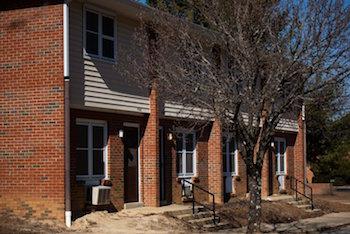
Amid the loss of income, the biggest expense for the vast majority of those workers was sometimes left unpaid: rent.
To answer this need, Congress allocated billions of dollars in rental assistance through federal stimulus funds. North Carolina cities and counties received those funds to oversee disbursement.
Cumberland County and the city of Fayetteville received a combined $18.1 million, which they jointly used to create the Fayetteville Cumberland Rental Assistance Program, or RAP.
Nearly eight months after RAP launched, more than $17.3 million has been spent — almost 96% — to aid more than 7,600 renting households, according to figures from the city and county provided to Carolina Public Press late last week.
As of Monday, the program is not accepting new applications until it gets new funding, as program administrators still need to work through over 5,000 pending applications.
More than 750 new COVID-19 cases, due to the omicron variant, were reported in Cumberland County on a typical day throughout January, well above rates before this surge.
If the pandemic continues to close businesses and eliminate jobs, then more help will be needed, said Dee Taylor, Cumberland community development director.
“There’s some uncertainty of what our future poses as it relates to this crisis,” she said. “If this continues, then yes, more than likely, we’re going to need additional aid in the future.”
‘We were already struggling’
Before the pandemic, tenants in Cumberland County were already struggling to pay rent.
According to the U.S. Census Bureau’s five-year American Community Survey in 2019, 48% of renting households spent 30% or more of their income on housing costs.
That’s higher than the statewide rate of 43% for the same time frame.
The target for many housing experts and advocates is to keep housing costs at or below that 30% mark.
“We were already struggling with the lack of affordable housing in our community,” Taylor said. “We’ve always had a short supply of affordable housing. As far as the housing market, it does not help those who are living in poverty. To be able to afford the market rate housing in our community — that’s where you have a big challenge, especially in this community.”
Increased fees on new round of assistance
In the last $1.7 million of federal funding into Cumberland’s portion of RAP, the county Board of Commissioners increased the portion of administrative fees and housing stability services from 8% to 25%, CPP previously reported.
This is the maximum that U.S. Treasury Department guidelines allow.
While RAP will spend 15% on administration by Innovative Emergency Management, the agency that the county and city contracted to disburse the aid, the remaining 10% will be spent on housing stability services.
The U.S. Treasury, in its guidelines for emergency rental aid disbursement, allows for eviction diversion programs and case management related to housing stability, among others, under these services.
Taylor said the eviction diversion could be used to offset the tenant’s costs for legal services and court fees when facing eviction.
She would anticipate that a majority, though, would be spent on case management, as it helps finalize rental assistance agreements between tenant and landlord, especially in Cumberland’s case as it navigates through its remaining applications, she said.
“In general, it helps (tenants) navigate through the application process,” Taylor said.
“When they submit their application, they still have to turn in certain documentation to show that they’re eligible for the program. … Sometimes, not always, a lot of times the applications are not always complete with the required documentation.
“So, the case managers are there to help them gather that information and service the end communication between the tenant and the landlord.”
Photo Credit: Multi-family housing in the Stanton Arms complex off Whitfield Street in Fayetteville is seen on Saturday. Melissa Sue Gerrits / Carolina Public Press

 How to resolve AdBlock issue?
How to resolve AdBlock issue? 








